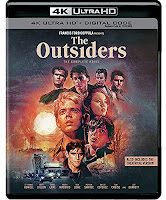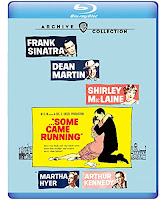the traveler's resource guide to festivals & films
a FestivalTravelNetwork.com site
part of Insider Media llc.
Reviews
December '21 Digital Week I
- Details
- Parent Category: Film and the Arts
- Category: Reviews
- Published on Wednesday, 01 December 2021 23:57
- Written by Kevin Filipski
Ballet & Pride On Display at Lincoln Center
- Details
- Parent Category: Film and the Arts
- Category: Reviews
- Published on Wednesday, 01 December 2021 18:29
- Written by Jack Angstreich

Scene from Bernstein in a Bubble. Photo: Rosalie O’Connor.
After a first week featuring performances of the beloved repertory staple, Giselle, the second week of the Fall Season at American Ballet Theater at the David H. Koch Theater was devoted to several mixed programs, including the Fall Gala. On Wednesday, October 27th, I had the privilege to attend an excellent evening—celebrating Gay Pride—of four dance pieces, beginning with the most extraordinary of all, the witty Bernstein in a Bubble, by Artist in Residence, Alexei Ratmansky, probably the greatest living choreographer, at least among those that employ a classical vocabulary. Set to the jazz-inflected Divertimento, one of Leonard Bernstein’s strongest orchestral scores, Ratmansky here seems to have devised a delightful hommage to the composer’s brilliant collaborator, Jerome Robbins. The work featured an impressive cast, including Skylar Brandt, Chloe Misseldine, Cassandra Trenary, Aran Bell, Patrick Frenette, Blane Hoven, and Tyler Maloney.
Touché by Christopher Rudd and set to music by Woodkid and the magnificent film composer, Ennio Morricone, was an ultimately moving gay love duet, elegantly executed by Calvin Royal III and João Menegussi. Even better was a second duet, by Clark Tippet, Some, choreographed to the Second Sonata for Violin and Piano by William Bolcom, and effectively performed by Brandt and Gabe Stone Shayer.
The dance portion of the program concluded strongly with Indestructible Light by Darrell Grand Moultrie, set to jazz pieces by Duke Ellington, Count Basie, Neal Hefti, Billy Strayhorn, and Chuck Harmony, again with a remarkable cast including Jacob Clerico, Michael De La Nuez, Annabel Katsnelson, Kanon Kimura, Melvin Lawovi, Hannah Marshall, Betsy McBride, and Duncan McIlwaine. A fabulous bonus to the evening was the appearance of the dazzling Lypsinka performing her famous act answering telephones while lip-syncing to classic Hollywood actresses, like Elizabeth Taylor and Faye Dunaway, speaking in old films. The event ended with a talkback about Touché with Rudd, Royal, and Menegussi, along with Sarah Lozoff, the consulting Intimacy Director for Ballet Theater’s Fall 2021 Season.
A second program on the following night was even more outstanding, beginning with the exquisite La Follia Variations by Lauren Lovette, set to wonderful Baroque music by Francesco Geminiani, “re-imagined and arranged” by Michi Wiancko, featuring Scott Forsythe, Jonathan Klein, Emily Hayes, Lawovi, Kimura, Clerico, Fangqi Li, and Joseph Markey. Most exciting though was the opportunity to see the compelling Pillar of Fire—set to Arnold Schoenberg’s early, glorious Verklärte Nacht—by Antony Tudor who, after George Balanchine and Frederick Ashton, was one of the premier choreographers of the twentieth century that worked in the classical idiom and whose creations are now sadly undervalued. The primary cast was superb, featuring above all the astonishing Gillian Murphy—who was exceptional in the eponymous role in Giselle the previous week—as Hagar, ably complemented by Stephanie Petersen as the Eldest Sister, Zimmi Coker as the Youngest Sister, Thomas Forster as the Friend, and Cory Stearns as the man from the House Opposite, with characteristically accomplished support from the corps de ballet.
The evening ended delightfully with the brilliant ZigZag—by the admirable Jessica Lang—choreographed to a marvelous selection of songs sung by the inimitable Tony Bennett, including: “What the World Needs Now” by Burt Bacharach with lyrics by Hal David; the signature “I Left My Heart in San Francisco”; "Fascinating Rhythm" by George and Ira Gershwin; “Spring in Manhattan”; Cole Porter’s “It's De-Lovely,” a duet with Lady Gaga; "Just One of Those Things,” also by Porter; “Smile” by Charlie Chaplin, from his classic late feature, Limelight; “Blue Moon” by Richard Rodgers and Lorenz Hart; Duke Ellington’s "It Don't Mean a Thing (If It Ain't Got That Swing)”; and "How Do You Keep the Music Playing?" with music by Michel Legrand and lyrics by Alan and Marilyn Bergman. The enchanting cast included Isabella Boylston, Katherine Williams, Erica Hall, Bell, Hoven, and Royal, with exemplary assistance from members of the corps. I look forward to the return of this terrific company to Lincoln Center in the spring.
Broadway Musical Review: “Diana—The Musical”
- Details
- Parent Category: Film and the Arts
- Category: Reviews
- Published on Monday, 29 November 2021 22:33
- Written by Kevin Filipski
 |
| Jeanna de Waal (center) in Diana—The Musical |
November '21 Digital Week III
- Details
- Parent Category: Film and the Arts
- Category: Reviews
- Published on Thursday, 25 November 2021 00:49
- Written by Kevin Filipski
More Articles...
Newsletter Sign Up
























